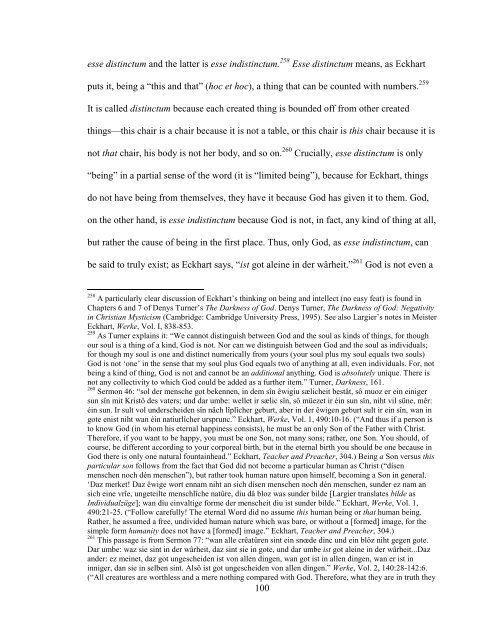the mystical theology of valentin weigel - DataSpace at Princeton ...
the mystical theology of valentin weigel - DataSpace at Princeton ...
the mystical theology of valentin weigel - DataSpace at Princeton ...
You also want an ePaper? Increase the reach of your titles
YUMPU automatically turns print PDFs into web optimized ePapers that Google loves.
esse distinctum and <strong>the</strong> l<strong>at</strong>ter is esse indistinctum. 258 Esse distinctum means, as Eckhart<br />
puts it, being a “this and th<strong>at</strong>” (hoc et hoc), a thing th<strong>at</strong> can be counted with numbers. 259<br />
It is called distinctum because each cre<strong>at</strong>ed thing is bounded <strong>of</strong>f from o<strong>the</strong>r cre<strong>at</strong>ed<br />
things—this chair is a chair because it is not a table, or this chair is this chair because it is<br />
not th<strong>at</strong> chair, his body is not her body, and so on. 260 Crucially, esse distinctum is only<br />
“being” in a partial sense <strong>of</strong> <strong>the</strong> word (it is “limited being”), because for Eckhart, things<br />
do not have being from <strong>the</strong>mselves, <strong>the</strong>y have it because God has given it to <strong>the</strong>m. God,<br />
on <strong>the</strong> o<strong>the</strong>r hand, is esse indistinctum because God is not, in fact, any kind <strong>of</strong> thing <strong>at</strong> all,<br />
but ra<strong>the</strong>r <strong>the</strong> cause <strong>of</strong> being in <strong>the</strong> first place. Thus, only God, as esse indistinctum, can<br />
be said to truly exist; as Eckhart says, “ist got aleine in der wârheit.” 261 God is not even a<br />
258 A particularly clear discussion <strong>of</strong> Eckhart’s thinking on being and intellect (no easy fe<strong>at</strong>) is found in<br />
Chapters 6 and 7 <strong>of</strong> Denys Turner’s The Darkness <strong>of</strong> God. Denys Turner, The Darkness <strong>of</strong> God: Neg<strong>at</strong>ivity<br />
in Christian Mysticism (Cambridge: Cambridge University Press, 1995). See also Largier’s notes in Meister<br />
Eckhart, Werke, Vol. I, 838-853.<br />
259 As Turner explains it: “We cannot distinguish between God and <strong>the</strong> soul as kinds <strong>of</strong> things, for though<br />
our soul is a thing <strong>of</strong> a kind, God is not. Nor can we distinguish between God and <strong>the</strong> soul as individuals;<br />
for though my soul is one and distinct numerically from yours (your soul plus my soul equals two souls)<br />
God is not ‘one’ in <strong>the</strong> sense th<strong>at</strong> my soul plus God equals two <strong>of</strong> anything <strong>at</strong> all, even individuals. For, not<br />
being a kind <strong>of</strong> thing, God is not and cannot be an additional anything. God is absolutely unique. There is<br />
not any collectivity to which God could be added as a fur<strong>the</strong>r item.” Turner, Darkness, 161.<br />
260 Sermon 46: “sol der mensche got bekennen, in dem sîn êwigiu sælicheit bestât, sô muoz er ein einiger<br />
sun sîn mit Kristô des v<strong>at</strong>ers; und dar umbe: wellet ir sælic sîn, sô müezet ir éin sun sîn, niht vil süne, mêr:<br />
éin sun. Ir sult vol underscheiden sîn nâch lîplîcher geburt, aber in der êwigen geburt sult ir ein sîn, wan in<br />
gote enist niht wan éin n<strong>at</strong>iurlîcher ursprunc.” Eckhart, Werke, Vol. 1, 490:10-16. (“And thus if a person is<br />
to know God (in whom his eternal happiness consists), he must be an only Son <strong>of</strong> <strong>the</strong> Fa<strong>the</strong>r with Christ.<br />
Therefore, if you want to be happy, you must be one Son, not many sons; ra<strong>the</strong>r, one Son. You should, <strong>of</strong><br />
course, be different according to your corporeal birth, but in <strong>the</strong> eternal birth you should be one because in<br />
God <strong>the</strong>re is only one n<strong>at</strong>ural fountainhead.” Eckhart, Teacher and Preacher, 304.) Being a Son versus this<br />
particular son follows from <strong>the</strong> fact th<strong>at</strong> God did not become a particular human as Christ (“dísen<br />
menschen noch dén menschen”), but ra<strong>the</strong>r took human n<strong>at</strong>ure upon himself, becoming a Son in general.<br />
‘Daz merket! Daz êwige wort ennam niht an sich dísen menschen noch dén menschen, sunder ez nam an<br />
sich eine vrîe, ungeteilte menschlîche n<strong>at</strong>ûre, diu dâ bloz was sunder bilde [Largier transl<strong>at</strong>es bilde as<br />
Individualzüge]; wan diu einvaltige forme der menscheit diu ist sunder bilde.” Eckhart, Werke, Vol. 1,<br />
490:21-25. (“Follow carefully! The eternal Word did no assume this human being or th<strong>at</strong> human being.<br />
Ra<strong>the</strong>r, he assumed a free, undivided human n<strong>at</strong>ure which was bare, or without a [formed] image, for <strong>the</strong><br />
simple form humanity does not have a [formed] image.” Eckhart, Teacher and Preacher, 304.)<br />
261 This passage is from Sermon 77: “wan alle crê<strong>at</strong>ûren sint ein snœde dinc und ein blôz niht gegen gote.<br />
Dar umbe: waz sie sint in der wârheit, daz sint sie in gote, und dar umbe ist got aleine in der wârheit...Daz<br />
ander: ez meinet, daz got ungescheiden ist von allen dingen, wan got ist in allen dingen, wan er ist in<br />
inniger, dan sie in selben sint. Alsô ist got ungescheiden von allen dingen.” Werke, Vol. 2, 140:28-142:6.<br />
(“All cre<strong>at</strong>ures are worthless and a mere nothing compared with God. Therefore, wh<strong>at</strong> <strong>the</strong>y are in truth <strong>the</strong>y<br />
100
















